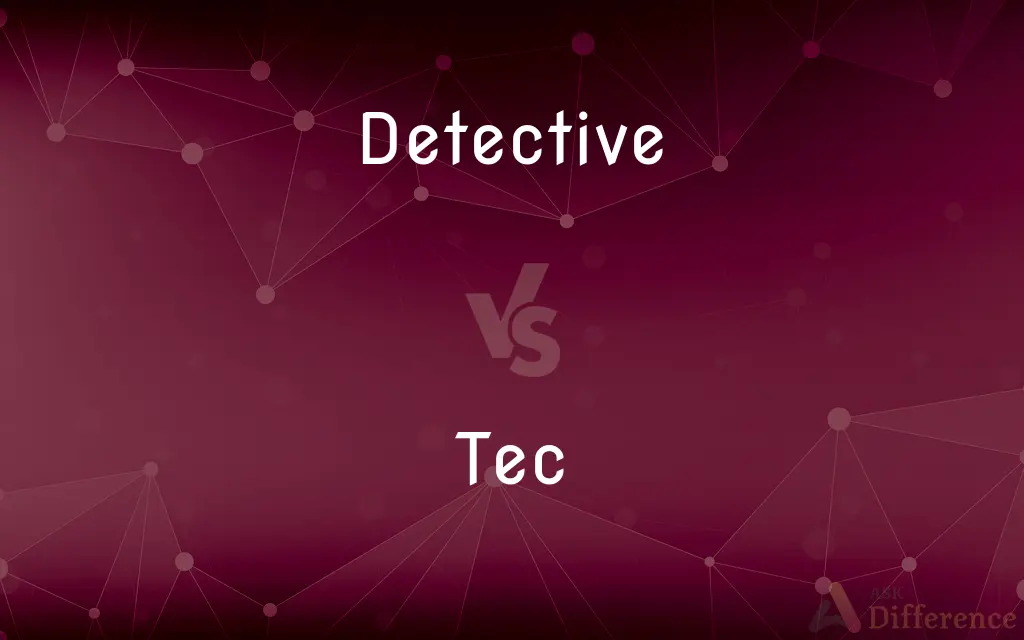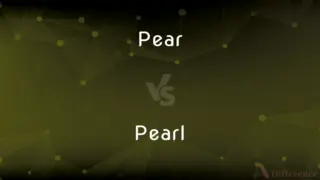Detective vs. Tec — What's the Difference?
Edited by Tayyaba Rehman — By Maham Liaqat — Updated on April 9, 2024
A detective is a professional investigator, often associated with law enforcement, skilled in solving crimes. A "tec" is informal slang for a detective, carrying the same professional connotations but in a more casual or colloquial context.

Difference Between Detective and Tec
Table of Contents
ADVERTISEMENT
Key Differences
A detective is a law enforcement officer or a private investigator who specializes in solving crimes through gathering facts and evidence. They work on various cases, including homicides, thefts, and fraud, employing analytical skills and often working undercover. Whereas "tec" is simply a shortened, slang term for detective, used informally.
Detectives undergo formal training and are required to have a deep understanding of the law, forensic science, and investigative techniques. They often start their careers as police officers before moving into detective roles. On the other hand, the term "tec" doesn't imply any specific training or qualification; it's a colloquialism that can be applied to anyone performing the duties of a detective, regardless of their training or background.
In the realm of public perception, detectives are viewed with respect and authority, recognized for their critical role in maintaining public safety and justice. The informal term "tec" might be used to evoke a sense of familiarity or affection for the profession, possibly diminishing the perceived formality but not the respect or the seriousness of the role.
The use of the term "tec" can also reflect cultural or historical contexts, often found in detective novels or films from the early to mid-20th century, giving a vintage or noir feel to the narrative. This contrasts with the more modern and professional image associated with the term detective, which is used in official and contemporary settings.
Despite the differences in terminology, the fundamental duties remain the same. Both terms denote professionals dedicated to investigating crimes, solving cases, and bringing perpetrators to justice. Whether referred to as a detective or a tec, the individual's role is critical in the criminal justice system, working behind the scenes to ensure public safety and order.
ADVERTISEMENT
Comparison Chart
Definition
A professional investigator, often in law enforcement.
Informal slang for a detective.
Training
Requires formal training in law enforcement and investigative techniques.
The term doesn’t imply any specific training.
Usage
Used in official and formal contexts.
Used informally or in literature and media.
Public Perception
Viewed with authority and respect.
May evoke a more casual or affectionate view.
Historical Context
The term is timeless but often associated with modern professionalism.
Often associated with vintage or noir narratives.
Compare with Definitions
Detective
Requires extensive training and knowledge of the law.
Before becoming a detective, he completed rigorous training at the police academy.
Tec
Can give a certain flair to characters or settings.
The hard-boiled tec in the film was known for his gritty determination.
Detective
Often works undercover to gather facts.
The detective went undercover to infiltrate the smuggling ring.
Tec
Slang for a detective, used informally.
The tec had a reputation for cracking tough cases.
Detective
Employs investigative techniques and analysis.
The detective used advanced forensic techniques to solve the case.
Tec
Implies no difference in role or function.
The old tec was a legend in the precinct for his investigative skills.
Detective
Works in various crime units (homicide, fraud, etc.).
As a homicide detective, she was well-versed in forensic analysis.
Tec
Used in casual conversation or literature.
In the novel, the tec navigated the dark alleys of the city, searching for clues.
Detective
A law enforcement officer specializing in solving crimes.
The detective spent hours at the crime scene, gathering evidence.
Tec
Reflects a casual or vintage tone.
The tec tipped his hat, a gesture from another era, as he left the room.
Detective
A detective is an investigator, usually a member of a law enforcement agency. They often collect information to solve crimes by talking to witnesses and informants, collecting physical evidence, or searching records in databases.
Tec
A police officer who investigates crimes
Detective
A person, usually a member of a police force, who investigates crimes and obtains evidence or information.
Detective
Of or relating to detectives or their work
Detective novels.
Detective
Suited for or used in detection.
Detective
(law enforcement) A police officer who looks for evidence as part of solving a crime; an investigator.
Detective
A person employed to find information not otherwise available to the public.
Detective
Employed in detecting.
Detective
Fitted for, or skilled in, detecting; employed in detecting crime or criminals; as, a detective officer.
Detective
One who business it is so detect criminals or discover matters of secrecy.
Detective
A police officer who investigates crimes
Detective
An investigator engaged or employed in obtaining information not easily available to the public
Common Curiosities
Are the duties of a detective and a tec different?
No, the duties are the same; "tec" is just an informal term for a detective.
What does "tec" mean?
"Tec" is informal slang for a detective, used in a more casual or colloquial manner.
Why might someone use the term "tec" instead of detective?
"Tec" might be used for brevity, in informal settings, or to evoke a certain stylistic or historical feel, especially in literature or media.
Can anyone be called a "tec"?
While "tec" is a slang term for detective, it generally refers to someone performing the duties of a detective, whether they are a professional law enforcement officer or a private investigator.
What is a detective?
A detective is a professional investigator, typically in law enforcement, who solves crimes by gathering evidence and analyzing facts.
What skills are important for a detective or tec?
Critical thinking, attention to detail, forensic knowledge, and an understanding of legal procedures are crucial for both detectives and tecs.
How is the role of a detective portrayed in popular culture?
Detectives are often portrayed as resourceful, determined, and adept at solving complex cases, with a strong moral compass guiding their work.
Can the slang term "tec" have different connotations based on context?
Yes, "tec" can evoke different images or feelings depending on the context, from the hard-boiled detective of noir fiction to a more affectionate, colloquial use.
How does one become a detective?
Becoming a detective usually requires starting as a police officer, gaining experience, and then receiving specialized training in investigative work.
Is the term "tec" used in official law enforcement?
"Tec" is more commonly found in informal contexts or in the media and is not typically used in official law enforcement terminology.
How has the perception of detectives changed over time?
The perception of detectives has evolved with societal changes, from the celebrated sleuths of early detective fiction to the more nuanced, complex figures seen in modern media.
What impact do detectives have on society?
Detectives play a critical role in ensuring public safety, solving crimes, and bringing justice to victims and their families.
What distinguishes a detective's work from that of regular police officers?
Detectives focus more on investigating crimes, analyzing evidence, and solving cases, as opposed to the broader duties of patrol and law enforcement that police officers typically perform.
Are detectives always part of the police force?
While many detectives are part of the police force, others work as private investigators or in other capacities within the criminal justice system.
Share Your Discovery

Previous Comparison
Pear vs. Pearl
Next Comparison
Karma vs. RetributionAuthor Spotlight
Written by
Maham LiaqatEdited by
Tayyaba RehmanTayyaba Rehman is a distinguished writer, currently serving as a primary contributor to askdifference.com. As a researcher in semantics and etymology, Tayyaba's passion for the complexity of languages and their distinctions has found a perfect home on the platform. Tayyaba delves into the intricacies of language, distinguishing between commonly confused words and phrases, thereby providing clarity for readers worldwide.
















































